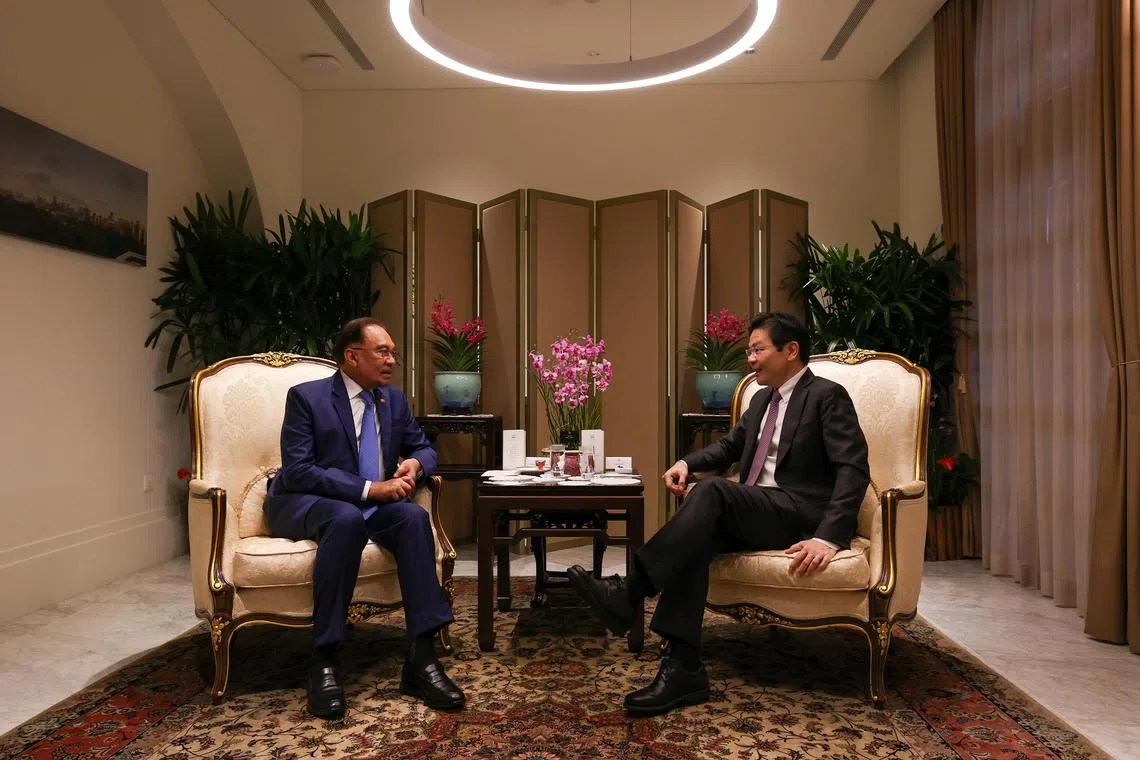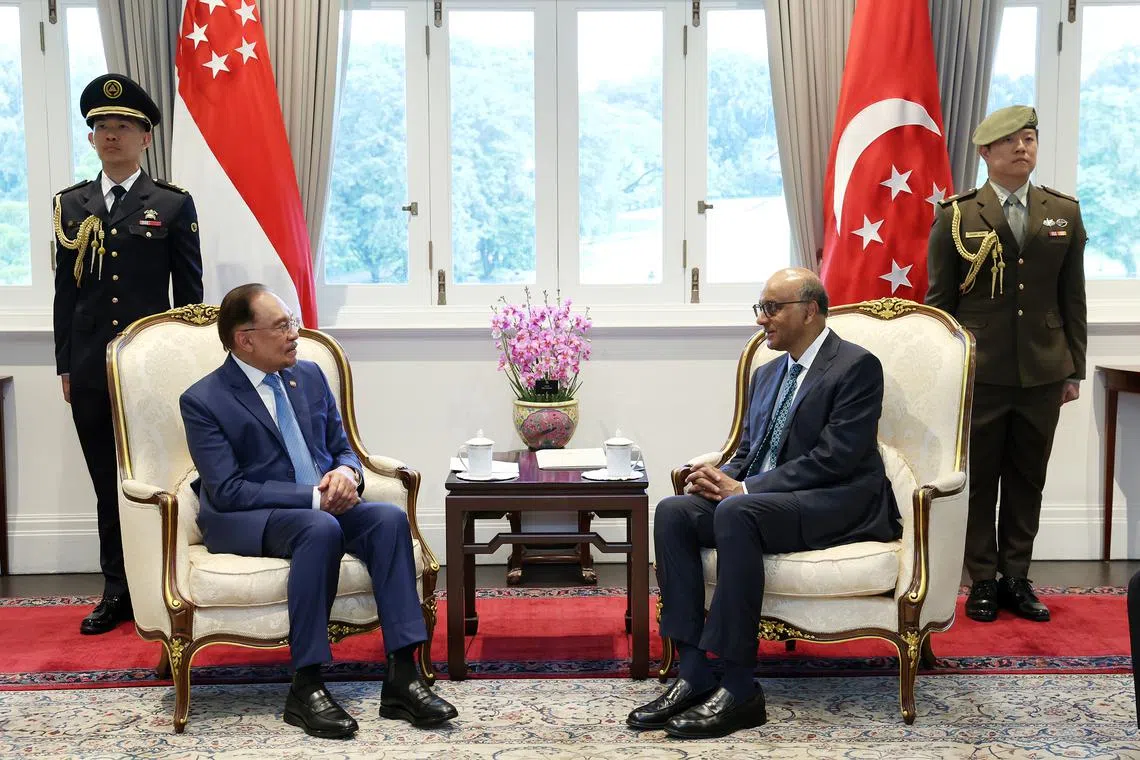Shangri-La Dialogue 2025
Economic disruptions can result in ‘systemic shock’ that goes beyond the region: Malaysia PM Anwar
Sign up now: Get ST's newsletters delivered to your inbox

Prime Minister Lawrence Wong hosting Malaysia's Prime Minister Anwar Ibrahim to tea at the Istana on May 31.
PHOTO: MDDI
SINGAPORE – Economic openness is not just the basis of prosperity and growth, but also a source of equilibrium that encourages nations, which have mutual exposure, to turn to restraint and caution, rather than confrontation.
But when this system of open markets is disrupted, what begins as a “commercial rupture” becomes a “systemic shock” with ripples that go beyond the region, said Malaysia’s Prime Minister Anwar Ibrahim on May 31, cautioning that these shifts are “rarely gradual”.
“What holds true for us holds true elsewhere: When trade flourishes, stability follows. When it falters, the consequences ripple far beyond any one region,” said Datuk Seri Anwar, who gave a special address at the 22nd Shangri-La Dialogue
This, too, has bearing on the regional security landscape, Mr Anwar said, adding that trade is not a soft power indulgence; rather, it is part of South-east Asia’s strategic architecture.
The annual event, Asia’s premier security summit, held from May 30 to June 1, brings together defence ministers, military chiefs and security experts from around the world to discuss key security issues in the Asia-Pacific region.
The security dialogue in Singapore comes at a time of heightened geopolitical uncertainty across the region, with various leaders looking to deepen cooperation in defence and maritime security, and establish regional stability through dialogue or multilateral engagements.
This includes security and diplomatic alliances, such as the Quad and Aukus, as well as economic partnerships such as free trade agreements, among others.
In his speech, Mr Anwar noted that it is currently a “sobering moment in history” as the number of armed conflicts, such as those in Ukraine, Gaza and Myanmar, is now at its highest since the end of World War II.
This undoubtedly has an impact on diplomacy and how security is structured, said Mr Anwar, adding that a stable region is not one braced for conflict, but one that is grounded in openness, transparency and cooperation.
“We do not object to like-minded partners talking amongst themselves. But coalitions that build walls instead of bridges, stoke arms competition or undermine the legitimacy of multilateralism should give us pause,” he said.
The genesis of Asean was in fostering stability in the region through the steady craft of consensus-building, and that foundation still holds, said Mr Anwar, pointing to the 46th Asean Summit and related meetings that were hosted by Kuala Lumpur on May 26 and 27. There, the milestone agreement to fully admit Timor-Leste as the regional grouping’s 11th member
At present, the 10 member states of Asean are Singapore, Malaysia, Indonesia, Brunei, Thailand, Vietnam, Cambodia, Laos, Myanmar and the Philippines.
And while some issues, such as the situation in member nation Myanmar, remain “grave” and unresolved, Mr Anwar said that Asean is “not standing still”.
“(We) are equally clear that the Five-Point Consensus dictates that a resolution that excludes those most affected by this crisis will not endure. Myanmar’s nationhood must be forged through inclusion, not erasure,” he said, referring to the peace plan drawn up by Asean
However, this peace plan that was drawn up months after the 2021 coup in Myanmar
The 2025 Asean gathering also saw the deepening of ties with the Gulf in the inaugural Asean-Gulf Cooperation Council-China Summit
But beyond these headlines, what matters most is Asean’s continued collaboration in areas like trade facilitation, cyber-security frameworks, cross-border data rules and cultural cooperation, which has shaped and strengthened the grouping.
“They may not be as dramatic, but they are no less vital, for they give South-east Asia greater impetus to act together. And the more we act together, the harder it becomes to be pulled apart by external gravity,” said Mr Anwar.
“Preserving our autonomy is not about resisting others. It is about strengthening ourselves. This, in essence, is what Asean centrality is about.”
Asean centrality broadly refers to approaching the grouping as the dominant regional platform to tackle common challenges and drive engagement with external powers.
It is the openness to goods, capital, ideas and people that has anchored Asean’s prosperity, stabilised its politics and strengthened regional cohesion, said Mr Anwar.
Turning to Malaysia’s posture of “active non-alignment”, he said that it is a deliberate way for the country to remain outward-facing, connected and in control of its strategic space.
“(But) the suggestion that if we do not align fully with one side, then we must have capitulated to the other, is untenable,” he said.
Highlighting the dispute over the South China Sea, Mr Anwar said that there was no interest in seeing tensions spiral into confrontation, especially in waters so crucial to regional security and prosperity. Malaysia is one of the several regional claimants of the contested waterway, over which China has claimed large swathes as well.
“Our objective is not achieved through escalation – nor by provoking others into disproportionate responses. It is best pursued through steady, principled diplomacy: quiet, where necessary, but always firm,” said Mr Anwar.
Circling back to the approach of active non-alignment, he said Malaysia will engage all who are willing, both major and middle powers alike. The intention is not to set one against the other, but to maximise its own strategic space.
And while a “strong and enduring” US presence in the region is welcomed, Malaysia also values its “vibrant and firm ties” with China as well as its “robust partnerships” across Asia, Europe and the Global South, he concluded.
Mr Anwar also called on President Tharman Shanmugaratnam, and they commended the excellent partnership between their two countries and underscored the importance of working even closer together in a more turbulent world, Singapore’s Ministry of Foreign Affairs (MFA) said.

Malaysian PM Anwar Ibrahim calling on President Tharman Shanmugaratnam on May 31.
PHOTO: MDDI
Mr Anwar also met Prime Minister Lawrence Wong, and took stock of the good progress in bilateral cooperation across various domains, including through initiatives like the Johor-Singapore Special Economic Zone
Said MFA: “They reiterated their shared commitment for ministers and officials on both sides to further step up mutual consultations to make concrete progress on outstanding bilateral issues, particularly as the two countries work towards the 12th Leaders’ Retreat, which Singapore will host.”
Tan Tam Mei is assistant foreign editor at The Straits Times. She oversees coverage of South-east Asia.



